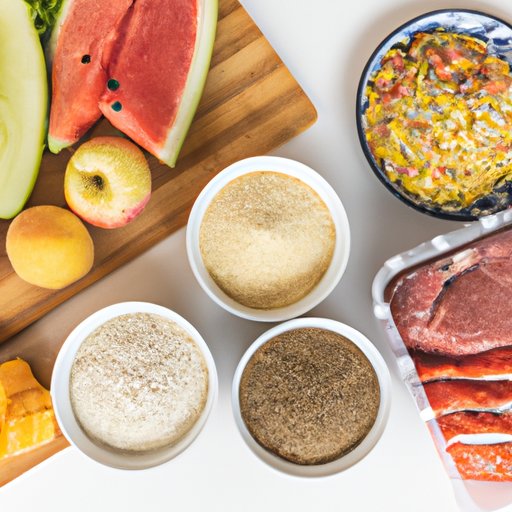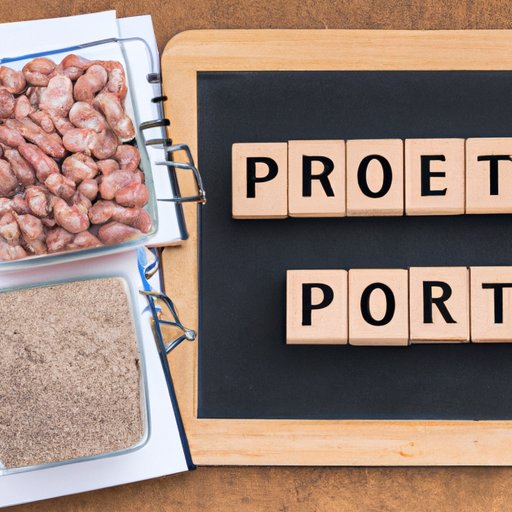
Introduction
As we go about our busy lives, we tend to forget the importance of eating a healthy diet. Our food choices can vastly impact our health, mood, and overall quality of life. It’s no surprise that incorporating a balanced and nutrient-rich diet is essential for a healthy lifestyle. A healthy diet not only helps you maintain a healthy weight, but it also reduces the risk of chronic diseases, increases energy, improves mental health, and promotes better sleep.
5 Reasons Why a Balanced Diet is Essential for a Healthy Lifestyle
Eating a balanced diet is crucial for your body’s functioning and overall well-being. Here are the five main reasons why:
Importance of Nutrient-Rich Foods
Nutrient-rich foods contain a variety of vitamins, minerals, and antioxidants that are essential for our body’s functioning. This includes whole grains, fruits, vegetables, lean proteins, and healthy fats. Eating these foods in the right proportion helps maintain balance and optimal health.
Benefits of a Balanced Diet
A balanced diet provides multiple benefits that enhance your physical and mental health. The following are five major benefits of incorporating a balanced diet:
Weight Management
A balanced diet helps you maintain a healthy weight and reduce the risk of obesity. It also boosts your metabolism and helps your body function better, preventing unnecessary weight gain.
Reduced Risk of Chronic Diseases
Consuming a well-balanced diet rich in nutrients helps reduce the risk of chronic diseases such as diabetes, heart disease, and cancer.
Increased Energy
Eating a balanced diet provides the necessary fuel and nutrients that help maintain optimal energy levels. It helps to fight against fatigue and enhances your work performance and physical activity.
Mental Health Improvements
A balanced diet provides the necessary nutrients essential for proper brain functioning. It improves concentration, alertness, and mood. Moreover, eating a balanced diet regularly helps to reduce depression, anxiety, and stress.
Improved Sleep
A balanced diet helps regulate your hormones and ensures that your body gets all the essential nutrients that it needs for proper functioning. This leads to better quality sleep and an improved sleep cycle.
The Top 7 Foods You Should Incorporate Into Your Diet for Optimal Health
Introduction to the Importance of the Food Groups
Foods are categorized into major groups that serve different purposes in our body. These groups are critical in maintaining a balanced diet, and it’s important to have a varied diet that includes food from each group.
List of the Food Groups
The following are seven essential food groups that you should incorporate into your diet:
- Fruits and Vegetables
- Whole Grains
- Lean Proteins
- Dairy Products
- Healthy Fats
- Nuts and Seeds
- Herbs and Spices
Explanation of the Benefits of Each Food Group
Fruits and vegetables are rich in vitamins and minerals that help in disease prevention and maintaining good health. Whole grains, on the other hand, are rich in fiber and help to reduce cases of heart disease, cancer, and diabetes. Lean proteins are crucial in building and repairing tissues, assisting in optimal growth, and helping maintain healthy hair and nails. Dairy products contain calcium and vitamin D, which are vital for strong bones and teeth. Healthy fats aid in reducing inflammation, promoting skin health and helping to maintain a healthy heart. Nuts and seeds are nutrient-rich foods that pack a powerful punch of minerals, vitamins, and essential nutrients that help keep your body healthy. Lastly, herbs and spices add flavor to your food and are known for their anti-inflammatory and antioxidant properties.
10 Simple and Delicious Recipes for a Healthy Diet
Introduction to Cooking Healthy Meals
Cooking healthy meals can seem daunting, but with a little practice, it can be an enjoyable and effortless process. It’s essential to prepare well-balanced meals that are rich in nutrients and flavors; here are ten simple, delicious recipes for a healthy diet.
List of Recipes
- Roasted Vegetable Quinoa Bowl
- Greek Yogurt Chicken Salad
- Smashed Avocado Toast with Egg
- Grilled Lemon Herb Salmon
- Mushroom and Spinach Frittata
- Black Bean and Sweet Potato Tacos
- Buddha Bowl with Peanut Sauce
- Tuna Stuffed Avocado Salad
- Chickpea and Vegetable Curry
- Spicy Cauliflower Rice Bowl
Detailed Instructions for Each Recipe
Recipes are intentionally omitted in this article due to space considerations.
How to Meal Prep for a Healthy Diet on a Budget
Introduction to Meal Prep
Meal prep involves planning, preparing, and cooking your meals ahead of time to ensure you eat a balanced diet and save money. Proper meal planning and preparation help streamline the process of making healthy choices, avoiding unhealthy fast foods and snacks. Here are some tips on how to meal prep for a healthy diet on a budget.
Benefits of Meal Prep
Meal prep saves a lot of time and helps reduce wastage by utilizing food effectively, saving money and protecting the environment. Additionally, it helps promote better eating choices, prevents impulse eating, and encourages portion control.
Tips for Meal Prepping on a Budget
It’s very affordable to meal prep while still maintaining variety and taste. Here are some tips on how to meal prep on a budget:
- Plan ahead
- Cook in bulk
- Utilize your freezer
- Shop for seasonal produce
- Focus on plant-based proteins
- Shop for staples in bulk
5 Common Myths About Healthy Eating That You Need to Stop Believing
Explanation of the Topic
In this section, we’ll debunk five of the most widely accepted myths about healthy eating and provide the right information on why you need to stop believing them.
List of the Myths
- All Fats are Bad
- Carbs are Evil
- Eating Small Meals Throughout the Day Increases Metabolism
- Organic Foods are Better for You
- Skipping Meals Can Help You Lose Weight
Explanation of Why the Myths are Not True
In reality, healthy fats, such as avocados, nuts, and olive oil, are beneficial for both heart and brain health. Carbs are an essential source of fuel for the body, and consuming moderate amounts is key to maintaining a healthy weight. Eating multiple small meals per day does not significantly affect metabolism, and organic foods have no significant nutritional differences from conventionally farmed foods. Lastly, skipping meals slows down the metabolism, which can lead to weight gain.

The Importance of Protein: How to Include More in Your Diet
Introduction to the Importance of Protein
Proteins are essential macronutrients in our diet, and they play vital roles in the growth, repair, and maintenance of our body tissues. Consuming sufficient amounts of protein-rich foods promotes healthy cell metabolism, hormone regulation, and immune function.
Benefits of Consuming Protein
Consuming sufficient amounts of protein provides the following benefits:
- Assists in building and repairing tissues
- Helps in optimal growth and development
- Helps maintain healthy hair and nails
- Aids in muscle recovery and growth
- Helps control appetite and reduce the risk of overeating
- Regulates blood sugar levels
- Promotes healthy weight loss
List of Healthy Protein Sources
The following are some of the best sources of protein that you can incorporate into your diet:
- Lean meat such as chicken, turkey, and beef
- Fish and seafood such as salmon, sardines, mackerel, and tuna
- Eggs
- Plant-based sources of protein such as beans, lentils, tofu, and tempeh
- Dairy products such as plain Greek yogurt, milk, and cheese
- Nuts and seeds such as peanuts, almonds, chia seeds, and hemp seeds
Tips for Adding More Protein to Your Diet
Here are some tips that can help you add more protein to your diet:
- Incorporate a source of protein in each meal
- Include protein-rich snacks such as nuts, seeds, or jerky
- Add legumes such as beans, lentils to your salads, soups, and stews
- Choose lean proteins such as chicken, turkey, fish
- Choose protein powders for convenience
What a Day of Eating Looks Like on a Clean, Balanced Diet
Introduction to Daily Food Intake
Clean eating is eating foods in their natural and purest form, such as fresh vegetables, whole grains, and lean proteins. Eating a clean, balanced diet nourishes your body with the essential nutrients it needs for optimal health. Here is an example of what a day of eating looks like on a clean, balanced diet
Explanation of Clean Eating
Clean eating involves consuming foods that are minimally processed or naturally grown such as fruits, vegetables, whole grains, and lean proteins. Clean eating excludes processed foods, packaged snacks, and foods high in sugar and saturated fats.
Sample Day of Clean Eating
Here is an example of a day of clean eating:
- Breakfast: Avocado Toast with Egg
- Snack: Apple with Peanut Butter
- Lunch: Grilled Lemon Herb Salmon with Steamed Vegetables
- Snack: Greek Yogurt with Berries and Honey
- Dinner: Mushroom and Spinach Frittata with Salad
- Snack: Almonds
Explanation of the Benefits of a Clean, Balanced Diet
A clean, balanced diet helps reduce the risk of chronic diseases such as obesity, diabetes, and heart disease. It also promotes healthy weight management, boosts energy levels, improves mood, and leads to better sleep quality.
Conclusion
In summary, a healthy diet is essential to achieve optimal health and well-being. A balanced diet made up of essential nutrients from all food groups, regular meal prep, and incorporating more healthy protein leads to a healthy lifestyle. By following the tips and recommendations outlined in this article, you can enjoy a nutritious and delicious diet that will optimize your health and well-being.
Recommendations
Start your journey to a healthier lifestyle, start by incorporating one healthy habit at a time and work your way up to a consistent way of eating. Don’t be afraid to experiment, cook new recipes, and try new foods that will excite your taste buds and promote a healthy, balanced diet.





